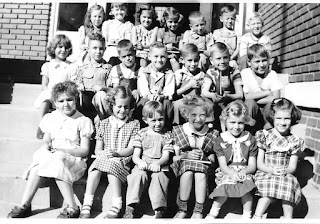 |
| Young ladies of Isaac's era |
During the late 1800s, the Populist Movement placed great emphasis on the character of the men and women involved. When Populists were elected to the Kansas state house they passed a law titled Seduction by Promise of Marriage, making it a criminal offense. In Isaac's County, a young man was sentenced to prison for 18 months as a result of his violation of that law.
Some of the populist organizations initially avoided political action and relied on education, improvements in character, and respect for others as the best means to make a success of their farms on the prairie. Even after political organizing began, many in Isaac's community continued their memberships in non-political groups.
Recently, among the old books in my collection, I was reading from one published in 1931, a few years after Isaac's time but long enough ago to reflect what young people of his era might have been taught. I could not help but consider the advice in a poem from a home economics book for teen-aged girls, as it relates to some of the news today. I have heard criticism of young women for putting themselves in situations where they were taken advantage of, blaming their behavior for what happened. Yet, could we still be giving young girls guidance not too dissimilar from the advice girls were given in this 1931 poem?
 |
| Young ladies schooled in the 1920s & 1930s |
Look Pleasant
We cannot, of course, all be handsome,
And it's hard for us all to be good;
We are sure now and then to be lonesome,
And we don't always do as we should.
To be patient is not always easy,
To be cheerful is much harder still,
But at least we can always be pleasant,
If we make up our minds that we will.
And it pays every time to be kindly,
Although we feel worried and blue;
If you smile at the world and look cheerful,
The world will smile back at you.
So try to brace up and look pleasant
No matter how low you are down,
Good humor is always contagious,
But you banish your friends when you frown.
 |
| Girls who entered school in the 1950s |
Is it any wonder that female teachers in the late 1800s acquiesced to being paid less than male teachers? Even I was once told that men were paid more than I was because they had a family to support! Is it any wonder that these young female teachers quietly accepted the rule forbidding them to wear patent leather shoes because the shiny leather might reflect their underwear! The members of the school board might have disapproved of their frown had they failed to "smile at the world and look cheerful" when they were told such things.
Is it any wonder that Black men were finally given the vote before women--black or white? Is it any wonder that those opposed to women's suffrage argued that women should be protected from the stress of political decisions, also claiming that women were ill-informed about and uninterested in political matters. Mary Elizabeth Lease and a few other populist women held crowds spellbound at Populist Rallies, but enough men continued to hold to their views that women had no business getting the vote that emancipation was voted down. I wonder if all of the women married to those male voters managed to "brace up and look pleasant."
And so, I asked myself how long that training to be patient, pleasant, and cheerful influenced girls. Does it offer insight into why a young woman meeting with a powerful or influential man who had agreed to discuss a job application or a potential career advancement might have found herself in a situation not of her own making and from which she saw no escape. At least, that is what I thought of as I read that poetic advice to girls published in 1931 and adhered to for decades.














